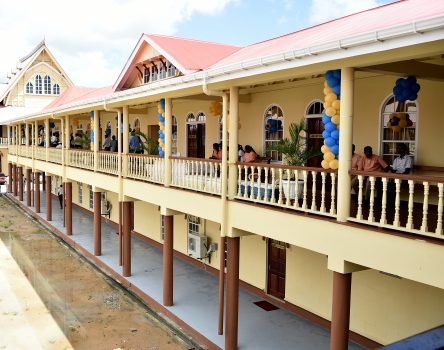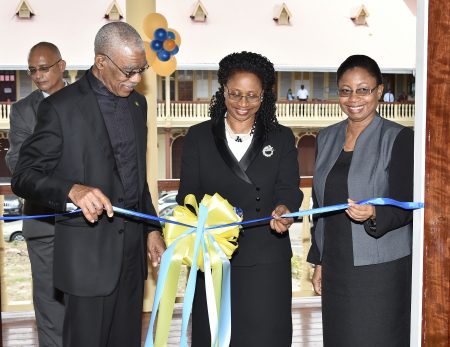The new wing of the Georgetown High Court, which now houses the Land Court and its Registry, was yesterday morning commissioned by President David Granger, who said it represents the beginning of a new chapter in the quest to improve the administration of and access to justice for all.
Delivering the feature address at the simple ceremony, President Granger said the administration of justice is the basis of civilized society, exemplified by the principles of judicial independence, impartiality and integrity.
Granger said that his administration is committed to ensuring the impartiality of the judiciary, by insulating it and the appointment of judicial officers from political influence.

He said the enactment of the Fiscal Management and Accountability Amendment Act, not long after his government took office in 2015, provides for the financial autonomy of the judiciary in accordance with constitutional provisions.
According to Article 122 (a), he noted, “All courts shall be administratively autonomous and shall be funded by direct charge upon the Consolidated Fund.” He declared that the judiciary is now administratively and financially autono-mous, while noting that the requests for funding no longer go to the executive.
Recalling the recent appointment of four new High Court judges and the construction of additional courtrooms in the new wing, the President said the efficiency of the judicial system will be advanced.
Granger emphasized equality before the law as a cardinal element of the nation’s constitutional democracy, protected by Article 149 of the Constitution, in that the State shall not deny any person equality before the law, or equal protection.
He said these can only be assured, where there is access to justice which is a basis for the rule of law, inherent in which the rights of citizens are protected, such as that to a fair trial, within reasonable time.
Granger said the opening of the new courts, and the resources provided by government for the construction of the new wing, represent his administration’s commitment to providing enhanced working conditions, and access to justice for all.

One precinct
With the new wing, the Land, Family, Commer-cial, Constitutional, Civil and Criminal divisions of the Georgetown High court are now being housed in the one precinct.
Acting Chancellor of the Judiciary Justice Yonette Cummings-Edwards, for her part, said the completion of the new wing is a significant achievement, as it now houses all divisions of the High Court in the one precinct. She said this allows for easier physical access for litigants and attorneys and easier management of the court and the registry and the saving of cost and expenses.
Noting the various locations at which it previously sat, Chancellor Cummings-Edwards said “the Land Court has come home,” likening it to the biblical “prodigal child.”
The new wing comprises two land courts in which the commissioners of title will now be sitting, its registry, three civil courts and a marshals’ section.
According to the Chancellor, the new wing was the brainchild of former chancellor Justice Carl Singh, and she suggested that it be named after him.
She said the new courtrooms will be equipped with modern technology in the not-too-distant future for an “e-judiciary,” marking the start of a modern era, involving changes which will improve access to, and the dispensation of justice.
The new wing bears the semblance of the historic Victorian architecture the Supreme Court has always had since it was commissioned 130 years ago in May of 1887.
President of the Bar Association Kamal Ramkarran, in brief remarks, echoed sentiments of both the President and Chancellor that the opening of the new wing is the latest in the series of developments which transform the face of legal practice in Guyana.
He said the developments show government’s commitment “to a significant improvement in access to, and delivery of justice.”




